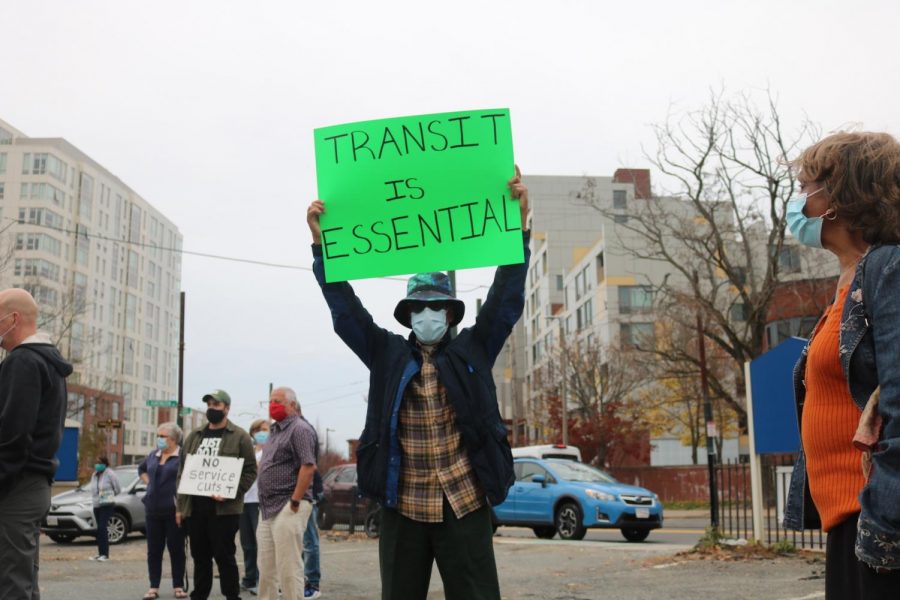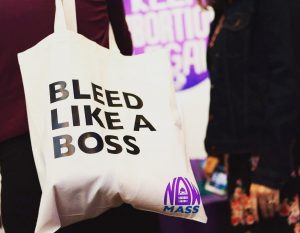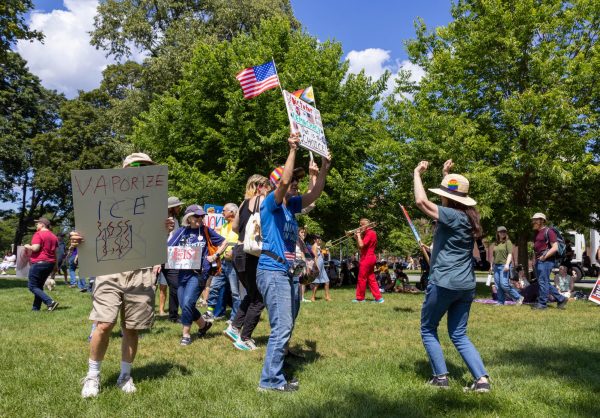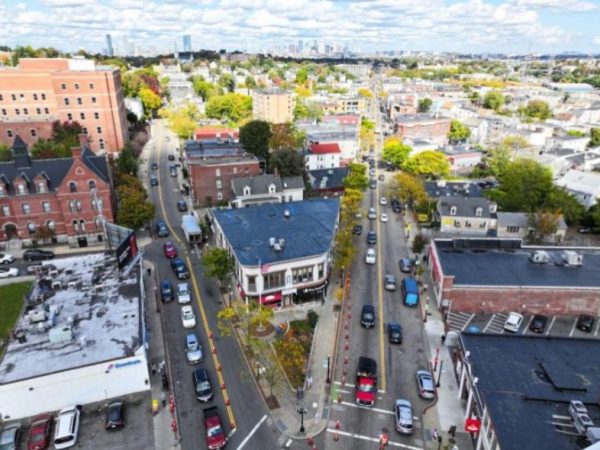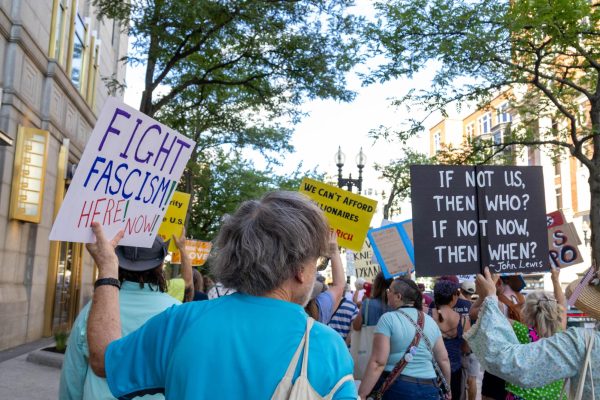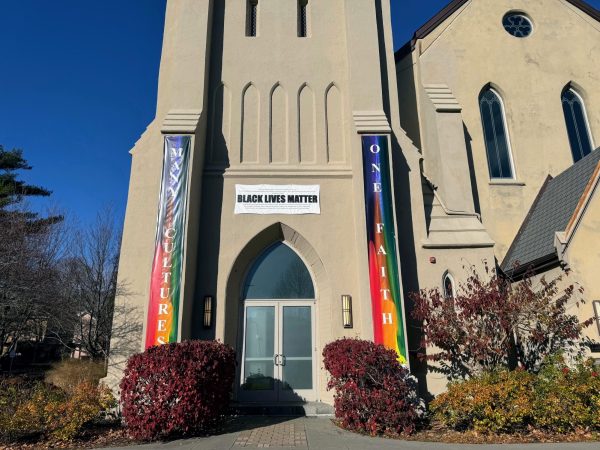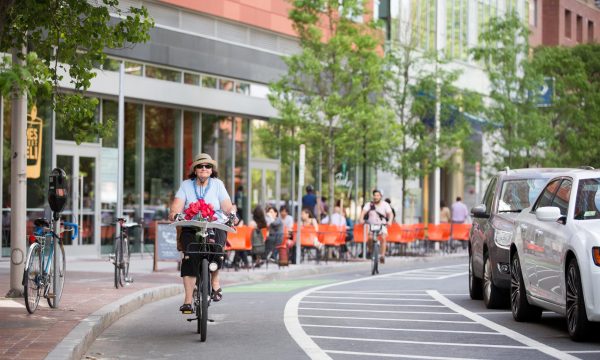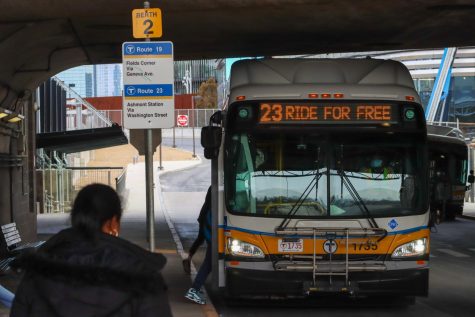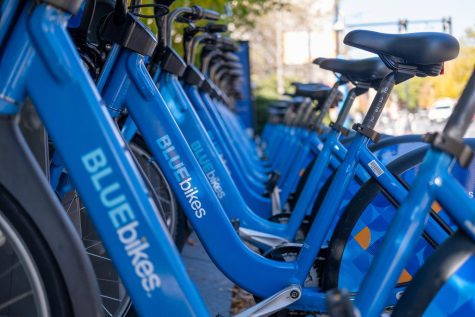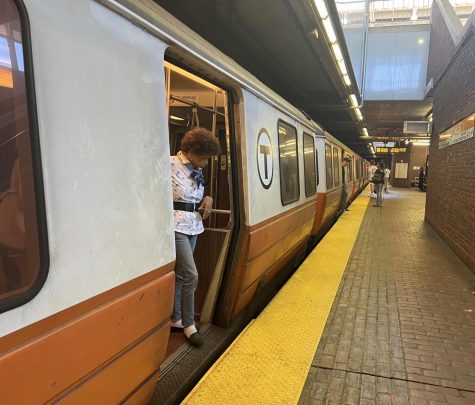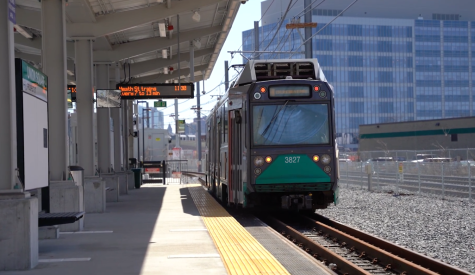The MBTA holds public meeting to discuss “Forging Ahead” plan for service cuts
Photo: Maya Homan
A protester holding up a sign “Transit is essential” at the Heath Street station protest in November against the MBTA service cuts.
Facing a projected budget deficit of $79 million in2021 and $653 million in 2022, the MBTA has announced that it will be slashing public transportation service starting in January of 2021. On Dec. 2, the MBTA held a public meeting to give a projected overview of the service cuts and listen to concerns from the public as it pushes forward with the “Forging Ahead” plan to reduce or eliminate service over the train, bus, commuter rail, RIDE and ferry services.
“I do want to make it clear that this is in reaction to a significant drop in ridership and a significant drop in revenue that has caused the significant shortfall in fiscal year 22,” said MBTA General Manager Steve Poftak. “This is not a long-term strategy to make the T smaller.”
Though the MBTA was able to solve the previous year’s budget deficit with $827 million in federal stimulus and CARES Act funding, those sources of revenue are not available for fiscal year 22, Poftak said. He also emphasized that the MBTA’s ridership is not expected to return to pre-COVID levels until at least 2022, and that other cities are facing similar decisions about how to solve transit-related budget deficits.
“One thing I want to make clear is the MBTA is not alone in this,” Poftak said. “This is not an MBTA problem, this is a transit problem. We’ve seen massive losses in ridership in systems across the country.”
Through the “Forging Ahead” plan, the MBTA aims to preserve the majority of its “essential service,” or public transit that has high ridership and serves a high level of transit critical populations.
“We’ve defined transit criticality as a basket of populations that includes low-income riders, people of color and areas with significant concentrations of people with disabilities.” Poftak said.
The Blue, Orange, Green and Red T lines, some bus routes, the Mattapan trolley and the Fairmount commuter rail line all fall into the “essential service” category. Other forms of transit, such as the ferry, the RIDE and some commuter rail lines and bus routes, are considered “non-essential,” meaning they have low ridership and/or fewer transit-critical riders.
Projected service changes for the T include stopping all service after midnight, reducing service frequency by 20% and ending the Green E line at Brigham circle, diverting passengers onto the 39 bus for the rest of the route.
Bus service, which has maintained the highest ridership during the pandemic at 41% of pre-COVID levels, faces more drastic service reductions. The “Forging Ahead” plan would implement a 5% reduction of service system-wide. As with the T, service would stop after midnight, and out of 169 total bus routes, 14 would be consolidated with other routes, five would be shortened and 25 would be eliminated entirely. Of the routes that are projected to be eliminated, seven are within ¼ mile of alternate transit options, six serve high levels of transit-critical populations but currently have low ridership and 12 routes have both low levels of transit-critical populations and low ridership.
Commuter rail services, which have maintained only 13% of their pre-COVID ridership, would be cut after 9 p.m. on weekdays and eliminated on weekends. The projected cuts would also result in the closure of six commuter rail stations.
Ferry services would be eliminated entirely, with passengers from the Charlestown/Boston ferry diverted onto the 93 bus line.
The RIDE will not adjust their service coverage areas, but will start charging premium prices for service in areas that are more than ¾ of a mile from an existing MBTA route. Like the T and bus lines, service will stop after midnight. The RIDE will also expand its scheduling window by 10 minutes, allowing passengers to book rides up to 40 minutes ahead of time.
The impending budget cuts have been met with harsh criticism from local residents, activist groups and elected officials who see the MBTA as an essential part of their communities. Boston City Councillors Michelle Wu and Kenzie Bok are among the most vocal opponents of the service cuts, and have urged the MBTA board to abstain from voting on service cuts until they have a better sense of what federal aid will be available under the Biden Administration in 2021.
Members of the public spoke at the Dec. 2 meeting to give feedback on various aspects of the MBTA’s proposal. Several speakers criticized the proposal to eliminate ferry services, arguing that the ability to sit outside makes it one of the safest modes of public transportation available during the pandemic.
Other speakers offered insight into the MBTA’s data collection, arguing that there are populations who are heavily dependent on public transit that the agency may have failed to take into account. Brook Weirs, a retired physician and resident of Hull, says that when he rides the 714 bus, only a quarter of the people riding will pay the fare.
“They’re broke,” Weirs said. “They’d rather wait for an hour for the 220 in the cold because they don’t have that amount of money. And so you might be under measuring both how much the ridership is because people aren’t paying, if that’s how you’re measuring, and also the criticality. I looked at that map, there’s no other place where when the MBTA is eliminated, people remain seven miles away from any other form of transportation. But if you look at the map, when you remove the 714 from Hull, people are going to just be stuck.”
Other speakers also voiced disappointment that service for transit critical populations would be cut, arguing that public transportation should be regarded as a public good rather than a service that’s meant to turn a profit.
An MBTA Advisory Board report released on Dec. 4 also advised against the service cuts, arguing that the projected budget deficit is about $124 smaller than the MBTA’s estimate, and that reducing and reallocating internal spending should be enough to cover most of the deficit.
“The Advisory Board’s view is that risk of permanent loss of ridership, increased congestion, and other negative effects of service cuts to people and communities is too high a price to pay right now, just as a vaccine is on the horizon,” the report said.
“It is also clear that paying to operate empty or nearly empty buses, trains, boats, and/or paratransit vehicles is not the best use of money from riders, communities, or taxpayers,” the report also said. “As such, the Advisory Board suggests that FMCB direct MBTA management to exercise its existing powers to make small, temporary, service changes, but not to the dramatic service cuts proposed by the MBTA.”
The meeting closed with a sense of uncertainty, as the MBTA officials did not specify what changes, if any, their current plan would undergo after listening to feedback from the public.. The MBTA Board is expected to vote on the changes at a meeting on Dec. 14.


